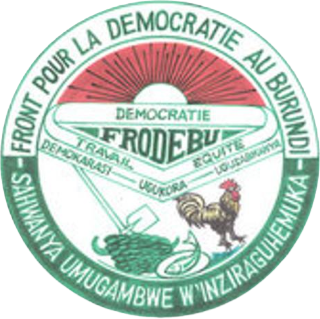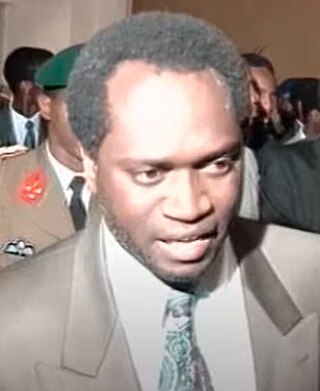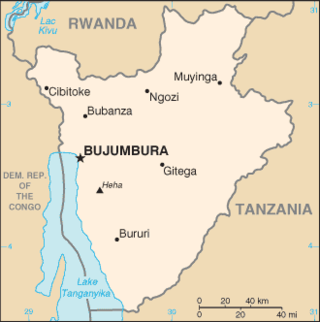The BurundiNational Defence Force is the state military organisation responsible for the defence of Burundi.

Burundi originated in the 16th century as a small kingdom in the African Great Lakes region. After European contact, it was united with the Kingdom of Rwanda, becoming the colony of Ruanda-Urundi - first colonised by Germany and then by Belgium. The colony gained independence in 1962, and split once again into Rwanda and Burundi. It is one of the few countries in Africa to be a direct territorial continuation of a pre-colonial era African state.
The Hutu, also known as the Abahutu, are a Bantu ethnic or social group which is native to the African Great Lakes region. They mainly live in Rwanda, Burundi and the eastern Democratic Republic of the Congo, where they form one of the principal ethnic groups alongside the Tutsi and the Great Lakes Twa.

"Burundi Bwacu" is the national anthem of Burundi. Written in the Kirundi language by a group of writers led by Jean-Baptiste Ntahokaja, a Catholic priest, and composed by Marc Barengayabo, it was adopted upon independence in 1962.

Cyprien Ntaryamira was a Burundian politician who served as President of Burundi from 5 February 1994 until his death two months later. A Hutu born in Burundi, Ntaryamira studied there before fleeing to Rwanda to avoid ethnic violence and complete his education. Active in a Burundian student movement, he cofounded the socialist Burundi Workers' Party and earned an agricultural degree. In 1983, he returned to Burundi and worked agricultural jobs, though he was briefly detained as a political prisoner. In 1986 he cofounded the Front for Democracy in Burundi (FRODEBU), and in 1993 FRODEBU won Burundi's general elections. He subsequently became the Minister of Agriculture and Animal Husbandry on 10 July, but in October Tutsi soldiers killed the president and other top officials in an attempted coup.

Pierre Buyoya was a Burundian army officer and politician who served two terms as President of Burundi in 1987 to 1993 and 1996 to 2003. He was the second-longest-serving president in Burundian history.

The Front for Democracy in Burundi is a Hutu progressive political party in Burundi.

Melchior Ndadaye was a Burundian banker and politician who became the first democratically elected and first Hutu president of Burundi after winning the landmark 1993 election. Though he attempted to smooth the country's bitter ethnic divide, his reforms antagonised soldiers in the Tutsi-dominated army, and he was assassinated amidst a failed military coup in October 1993, after only three months in office. His assassination sparked an array of brutal tit-for-tat massacres between the Tutsi and Hutu ethnic groups, and ultimately led to the decade-long Burundi Civil War.

Sylvie Kinigi is a Burundian politician and economist who served as prime minister of Burundi from 10 July 1993 to 7 February 1994, and acting president from November 1993 to 5 February 1994, making her the second African woman to serve as a president.

Presidential elections were held in Burundi on 1 June 1993 following the approval of a new constitution in a referendum the previous year. They were the first multi-party elections for the presidency, the only previous elections in 1984 having been held at a time when the country was a one-party state. They were also only the second contested national elections held in the country since independence in 1962.

Parliamentary elections were held in Burundi on 29 June 1993. They were the first multi-party parliamentary elections since 1965, and followed the approval of a new constitution in a referendum in 1992. The result was a victory for the Front for Democracy in Burundi, which won 65 of the 81 seats.
Burundi Workers' Party was a clandestine communist party in Burundi. Its primary constituency was the large Burundian refugee population situated in neighboring Rwanda.

Mass killings of Tutsis were conducted by the majority-Hutu populace in Burundi from 21 October to December 1993, under an eruption of ethnic animosity and riots following the assassination of Burundian President Melchior Ndadaye in an attempted coup d'état. The massacres took place in all provinces apart from Makamba and Bururi, and were primarily undertaken by Hutu peasants. At many points throughout, Tutsis took vengeance and initiated massacres in response.

Melchior Ndadaye International Airport is an airport in Bujumbura, the former capital of Burundi. It is Burundi's only international airport and the only one with a paved runway.

United Nations Security Council resolution 1012, adopted unanimously on 28 August 1995, after considering the situation in an African landlocked country, Burundi. The council established an international inquiry over the assassination of President Melchior Ndadaye during a military coup in October 1993.

The 1996 Burundian coup d'état was a military coup d'état that took place in Burundi on 25 July 1996. In the midst of the Burundi Civil War, former president Pierre Buyoya deposed Hutu President Sylvestre Ntibantunganya. According to Amnesty International, in the weeks following the coup, more than 6,000 people were killed in the country. This was Buyoya's second successful coup, having overthrown Jean-Baptiste Bagaza in 1987.

A bloodless military coup took place in Burundi on 3 September 1987. Tutsi president Jean-Baptiste Bagaza was deposed whilst traveling abroad and succeeded by Tutsi Major Pierre Buyoya.

Starting December 3, 2021, all visitors to Burundi, unless they come from one of the visa-exempt countries mentioned below, can obtain a visa upon arrival at Bujumbura International Airport and all land borders. They can also obtain from one of the Burundian diplomatic missions before entering the country.

On 21 October 1993, a coup was attempted in Burundi by a Tutsi–dominated army faction. The coup attempt resulted in assassination of Hutu President Melchior Ndadaye and the deaths of other officials in the constitutional line of presidential succession. François Ngeze was presented as the new President of Burundi by the army, but the coup failed under domestic and international pressure, leaving Prime Minister Sylvie Kinigi in charge of the government.
Events in the year 2024 in Burundi.














